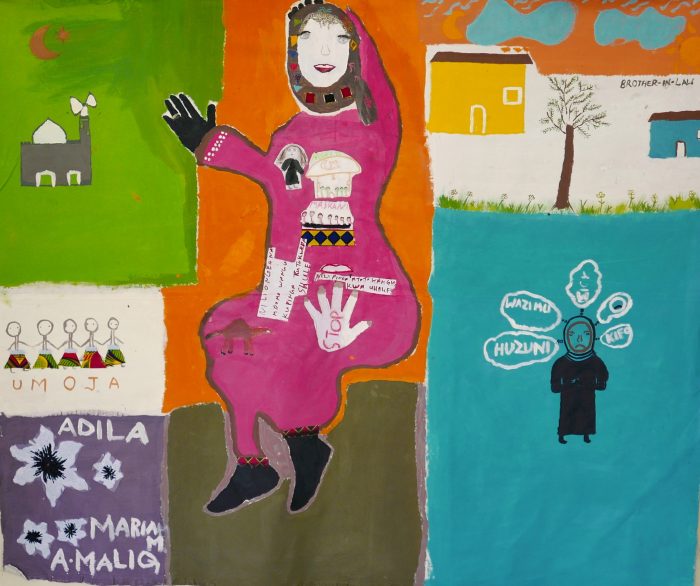Adila
I Saved Him
My painting is about helping others. It is also about saving an old man in my community. He was a friend of my father, too ill to look after himself. He needed someone to look after him, but he did not want to be washed by someone who was not related to him. I suggested that he married me so that I could look after him and he agreed.
The message I have for others is about thoughtfulness. This is about helping people, helping my son and self-help. It is also about unity within the community and between neighbours.
I chose this position for the body because this is how I sleep. When I lie down, many important thoughts come through my head, like about how to help these children: my own children and the community’s children, my neighbours’ children. I used green because it symbolises peace. The cream colour in the umoja side symbolises unity. I used the blue colour in my painting to symbolise the earth and the ocean, the sky and water.
The sky symbolises the sisterly love in this world. The yellow colour symbolises fire. I used the orange colour because it is captivating. I want people to be captivated by my words so that they know.
I drew myself wearing the abaya. The beautiful girl wearing black symbolises me. I love this, wearing hijab and abaya. This is my culture. I am a Muslim and an Arab. On the Hindu side of my family, they wear sarwal (trousers) but I love buibui (hijab and abaya). I love my religion. Prayers help me through the difficulties in my everyday life.
Prayer helps me resist and to remain strong. It guides me when I am struggling to make a decision.
Inside the body, I drew an animal that represents me. I chose a camel.
The camel is an important thing to me. The milk is medicinal – it treats a lot of diseases. The camel is known for its resilience, endurance and perseverance. It can take you to different places. It doesn’t get tired, plus it doesn’t disturb you every time it wants water or is thirsty.
I drew a picture of a Mskiti (mosque) and a moon in the painting. This is where my son was almost lost. He was almost recruited. I also drew daawah people, the ones who wanted to brainwash my son.
This experience still hurts me deeply. It is within me. It’s in me, in my heart, and that’s why I drew these people inside the body. The words – wazimu and huzuni – mean death, thoughts, sickness, craziness and sadness. This how I would feel had my son been recruited by Al-Shabaab.
The face is sulking in the picture and the hands are crossed that way because I am still thinking about whether the daawah men might come back and take my son away. Like lots of other women, I am still worried about this. He is unemployed now, and so I fear that if those people come back he may be recruited.
But I will not let it happen. I will make noise. I will go and look for them, wherever they are. I will pour petrol and burn the mosque down.
I drew a maskani as a warning to boys after what happened to my son. All of that is still with me. I still carry that pain in my heart. For me, breaking the maskani is important.
I wrote STOP here in red to symbolise stopping bloodshed. I wrote umoja too. This word means unity in Swahili. I feel part of the community. We live in unity and we support each other. That’s why I have jirani (my neighbours) in my picture. These are the neighbours who helped me in rescuing my child.
This is my family, myself, my son, the children, and the granddaughter. Whenever I have a problem or I feel under pressure or stressed, I go to my sister.
At my sister’s house, I feel safe, I open up about
my problems and I get advice. This is a place of importance for me. My brother-in-law is the one who has helped me so many times. Even when my son used to frequent the maskani and refused to study, my brother-in law is the one who helped me. That’s why I wanted to include him in my painting. That white part of the painting symbolises him.
Those are lips. They symbolise how I was able to speak out and resist. The words in Swahili are about speaking out. I have three younger sisters. After my parents died, we used to live with my aunt. Then, at some point, my aunt wanted to deny us our right to education and to stop us going to school so that we could work and do house chores. I spoke out against this, and I pleaded with my aunt. I volunteered to sacrifice myself to do the house chores and work, as long as my sisters were able to continue going to school. They went all the way to university. I am glad because I helped out my sisters. They are doing good jobs now.

